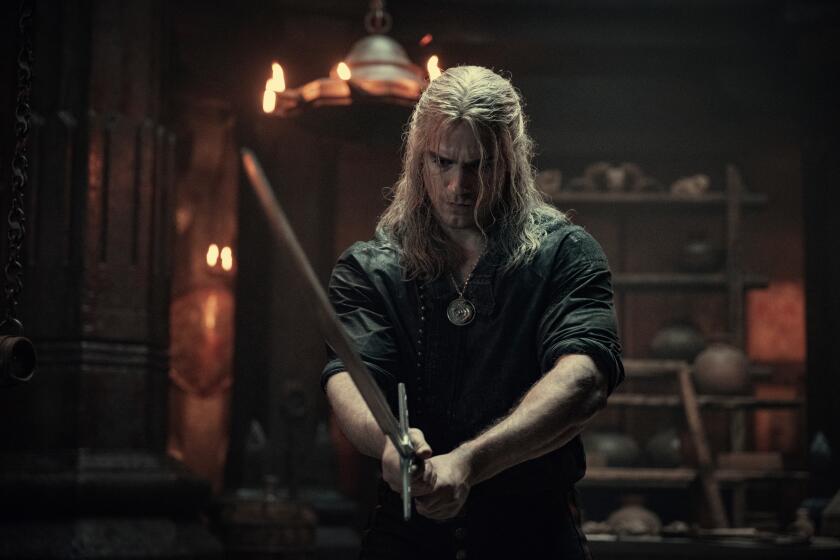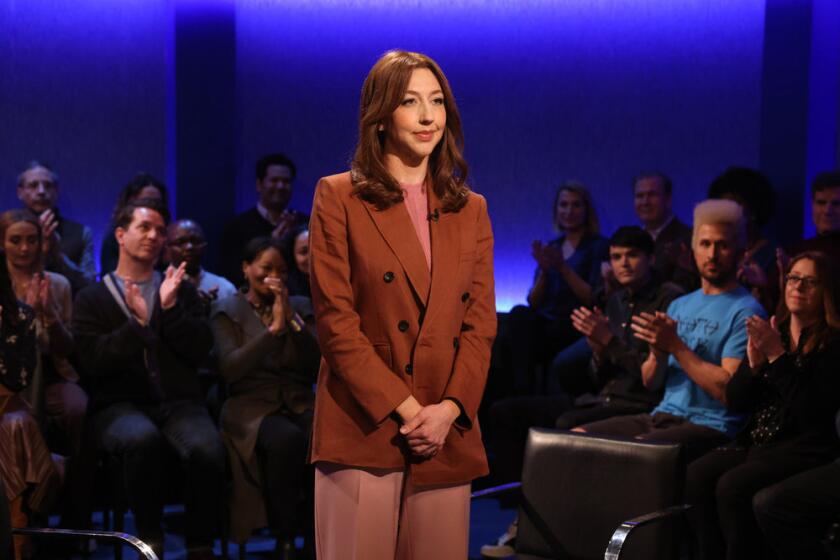The long move into ‘Grey Gardens’
Drew Barrymore, facing a window onto Central Park, held up a mirror. She took a long time reapplying her lipstick.
“Most of my best friends are gay and they all act like her, talk like her, dress like her at certain moments -- they all quote her all the time,” she said, in her somewhat spooky way.
Gay men -- well, not all of them, but many -- do revere and constantly talk about Edith “Little Edie” Bouvier Beale, the crazy-fabulous younger half of the East Hampton mother-and-daughter recluse team made famous by the 1975 Maysles brothers (and company) documentary “Grey Gardens.” The family had been flush in the Depression -- but, as revealed in the documentary, once left to their own devices, Jacqueline Kennedy’s aunt and cousin rapidly became crazy cat ladies and a town scandal. The last signs of their class were the house itself and their starchy, grating half-mid-Atlantic, half-Long Island accents.
So after Barrymore fought her way into that role for HBO’s “Grey Gardens,” which (1) premieres Saturday and (2) relates both the era covered by the documentary and the women’s younger lives, the gay anxiety struck her hard. After all, in the Venn diagram circles of gay Little Edie fan and gay friend of Drew Barrymore, the overlapping area approached 100%.
“I can’t tell you the level of fear and sickness I would feel when they would imitate her,” she said. “They know her and love her so well -- what if I do something that doesn’t feel right with them?” She swore profusely, her tongue piercing shining in the afternoon light.
Photographs of Barrymore these days, which usually suggest a starlet of the ‘40s or ‘70s, or a woman haunted, are not solely the work of an art director or photographer; that somewhat spooked and spooky thing exists in person. She is a little like Madonna while she was obsessed with Frida Kahlo or Evita -- a woman who strongly sees herself in or is bewitched by another woman’s character, so much so that it has leeched into her affect.
The proving ground
Of course, Little Edie was often otherwise occupied herself, famous as she was for wrapping herself in odd garments while the raccoons ate away at the house and her mother cooked corn in bed.
In any event, with coaching, including from friends of the Beales, Barrymore did get herself there. Chris Miller, the vice president of Barrymore’s Flower Films and her full-time pretty-much-everything, was one of the first to hear Barrymore’s Edie.
“I was, like, close your eyes,” Barrymore said. “And I put my teeth in.”
“I think we both cried,” said Miller, from the other side of the hotel room.
“I think we did,” said Barrymore.
Barrymore’s other new best gay these days is “Grey Gardens” director Michael Sucsy. That relationship began, as all great ones do, with a meeting at the Chateau Marmont.
Producers had suggested Barrymore for the role. Sucsy didn’t want her. “Listen,” Sucsy said of his thoughts at the time: “I’ve worked with Drew now. How shall I say this? She was not proven in this genre!”
True enough. And what’s more, she was a hotshot producer -- “Charlie’s Angels,” hello -- and beginning to work as a director. So she was ridiculously busy, the producers told him -- and it would take her forever to get to the script.
Except Barrymore called back in 12 hours and said she was flying to L.A. the next day.
At that meeting, “I said, ‘Look I’m going to call out the elephant in the room,’ ” Barrymore said. “ ‘I’ve never done a part like this. I sound like a girl from the San Fernando Valley. I have nothing in my arsenal to prove to you I’m capable of doing this.’ ”
The meeting sold him. “No one had a gun to my head,” he said. “I cast her.”
The set was somewhat eccentric. There was Jessica Lange, who refuses to watch dailies but cannot stop herself from grilling everyone endlessly about what the previous day’s shoot was like. There was Barrymore, more or less staying in character, shutting herself in her room, typing notes on a typewriter, refusing to use cellphones.
Why not a merry band of wing nuts for a film about the same? “I don’t live in L.A., so I’m a little bit off the grid. So to speak,” said Lange, who plays “Big Edie,” Barrymore’s character’s mother. “But the first time [Barrymore] called me, it was interesting, I was doing a film in some remote place, maybe Canada somewhere, and she was just so exuberant and so kind of exclamatory about her desire to do this part and us to work together and I thought, wow, this is something quite unique.”
Sucsy is a little bit of a character himself; he went to the swank Deerfield Academy, and he originally knew of Grey Gardens, the titular East Hampton house, from riding his bicycle past it.
“He had a great sense of refinement, but he’s fun and outgoing and garish and human,” said Barrymore. “It’s not like he has a stick up his . . . .” Oh, OK, gotcha.
It’s miraculous they even found themselves there.
While Sucsy had been feverishly working on the film for years, Rachael Horovitz, formerly of Fine Line and then Revolution Studios, actually owned the rights to the documentary. Sucsy and his producing partner, Lucy Donnelly, owned “life rights” through the estate. (And, while each party schemed, a stage musical called “Grey Gardens” had been written, mounted and closed.)
Combined effort
Once Horovitz became an independent producer, she finally pursued her own “Grey Gardens” project.
“I reached out to them,” said Horovitz. “It was in the wake of the two Capote movies” -- and we all remember how that turned out. (For those who don’t, the short version is that it would have been lovely for almost everyone involved if there’d only been one. Except maybe for Philip Seymour Hoffman’s Academy Award.)
She was happy with Sucsy’s script, written with Patricia Rozema, and so, “We were all eager to get married,” she said.
So they went to the races together, to find another obstacle: Sucsy’s resume was nearly all commercials, no long-form dramas. “The only problem we had was the typical companies that make specialized movies, like say Paramount Vantage, they’re very director-driven,” said Horovitz. “They could not be as passionate about this film. Even Miramax.”
Still, she loved Sucsy’s reel; and, at the time, Lange and Barrymore were both at CAA, and CAA’s Peter Levine was an early “adoptive grandfather” of the film, according to Horovitz; and Sucsy turned out to love Barrymore; and, in the end, everyone loved HBO. Because, yes, as usual, everyone involved said amazingly nice things about HBO -- particularly about HBO’s now-departed original movies honcho Colin Callender, who brought the project in.
Plus? “They put a hell of a lot more money behind this movie than anyone wanted to in the equity market,” said Sucsy.
So a good time was had by all.
“It felt good,” said Lange, shortly before she went off to her remote Minnesota cabin to develop photographs in her darkroom; at said cabin, she promptly fell down and broke her collarbone. “I can’t say that about a lot of them anymore.”
--
The complete guide to home viewing
Get Screen Gab for everything about the TV shows and streaming movies everyone’s talking about.
You may occasionally receive promotional content from the Los Angeles Times.



